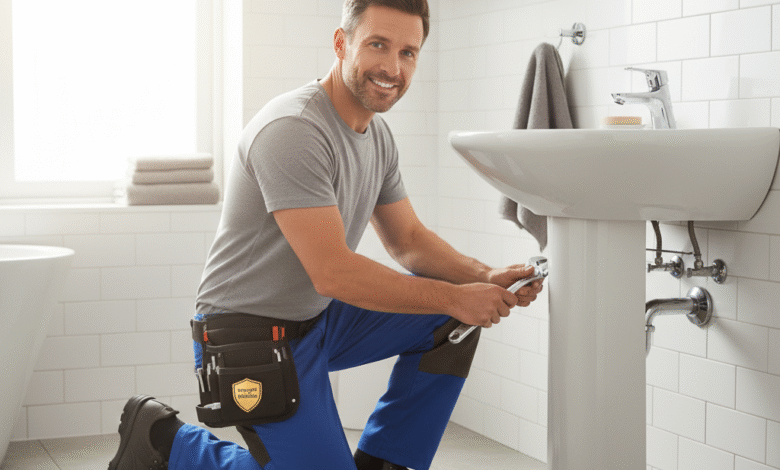What level of plumbers insurance do you really need to stay protected?

Being a plumber is a rewarding career, but it also comes with its fair share of risks. From burst pipes and faulty installations to accidental damage and injuries, there’s a lot that can go wrong on the job. That’s where having the right level of plumbers insurance becomes absolutely crucial. It’s not just about ticking a box; it’s about safeguarding your livelihood, your assets, and your peace of mind.
But with so many different types of cover available, how do you know what’s right for you? Do you need public liability, professional indemnity, or something else entirely? This guide will walk you through the essential types of trades insurance you need, helping you make an informed decision about protecting your plumbing business. Let’s dive in and explore what you need to consider.
Understanding the core types of plumbers insurance
Navigating the world of insurance can feel like wading through treacle. But it doesn’t have to be that way. Let’s break down some of the core types of insurance that plumbers should consider, explaining what they cover and why they’re important.
Public liability insurance: Protecting you from third-party claims
Imagine this: you’re working on a job, and a customer trips over your tools, injuring themselves. Or perhaps a leak from a pipe you’ve just installed causes damage to a client’s property. These are the kinds of situations where public liability insurance can be a lifesaver. This cover protects you if a third party (like a client or member of the public) suffers injury or property damage as a result of your work. It covers the legal costs and compensation you might be liable to pay.
Public liability insurance is often a minimum requirement for many plumbing jobs, especially if you’re working on commercial sites or for larger companies. It’s a fundamental type of trades insurance that provides a financial safety net against potentially crippling claims.
Professional indemnity insurance: Covering your advice and designs
As a plumber, you don’t just fix leaks; you also provide advice and design solutions for plumbing systems. But what happens if that advice turns out to be wrong or your design is flawed, leading to financial loss for your client? That’s where professional indemnity insurance comes in. It protects you against claims of negligence, errors, or omissions in the professional services you provide.
For example, if you designed a plumbing system that doesn’t meet building codes, and your client suffers a financial loss as a result, professional indemnity insurance can cover the costs of defending the claim and any compensation you’re required to pay. It’s essential cover for plumbers who offer design or consulting services.
Tools and equipment insurance: Safeguarding your essential assets
Your tools are your livelihood. Without them, you can’t do your job. Tools and equipment insurance protects your valuable assets against theft, damage, or loss. Imagine arriving at a job site to find your ute has been broken into, and all your tools are gone. Or perhaps a fire destroys your workshop, along with all your equipment.
Tools and equipment insurance can cover the cost of repairing or replacing your tools, allowing you to get back to work quickly. It’s worth considering whether you need “all risks” cover, which protects against a wider range of events, or a more basic policy that covers specific risks like theft and fire. Consider also insuring tools left in your work vehicle overnight, as these are particularly vulnerable.
Income protection insurance: Protecting your earning potential
What would happen if you were unable to work due to illness or injury? How would you pay your bills and support your family? Income protection insurance provides a regular income if you’re temporarily unable to work due to sickness or injury. It can cover a significant portion of your usual income, helping you meet your financial obligations while you recover.
As a self-employed plumber, you don’t have access to sick leave or workers’ compensation, making income protection insurance even more vital. It provides a safety net, ensuring you can keep your head above water financially when you’re unable to work.
Factors to consider when choosing your level of cover
Choosing the right level of plumbers insurance isn’t a one-size-fits-all decision. Several factors can influence the amount and type of cover you need. Here are some key considerations:
The size and scope of your plumbing business
Are you a sole trader, or do you employ a team of plumbers? Do you work on residential properties, commercial buildings, or both? The size and scope of your business will impact the level of risk you face. Larger businesses with more employees and a wider range of services will generally need higher levels of cover.
If you’re a sole trader working primarily on small residential jobs, you might be able to get away with a lower level of public liability insurance. However, if you’re working on large commercial projects, you’ll likely need a much higher limit. Consider the potential financial impact of a claim and choose a level of cover that adequately protects your business.
The types of plumbing services you offer
Do you specialise in certain types of plumbing work, such as gas fitting, drainage, or hot water systems? Some services carry a higher level of risk than others. For example, gas fitting work requires specialised skills and carries a higher risk of explosion or carbon monoxide poisoning. If you offer high-risk services, you’ll need to ensure your insurance covers these activities specifically.
Check the policy wording carefully to ensure that all the services you offer are covered. If you’re unsure, speak to an insurance broker who can help you find a policy that meets your specific needs.
Your contractual obligations
Many contracts, especially those for commercial projects, will specify minimum levels of insurance that you’re required to hold. These requirements are designed to protect the client in case something goes wrong. Before signing a contract, carefully review the insurance requirements and ensure that your policy meets these obligations.
Failing to meet the minimum insurance requirements can put you in breach of contract and expose you to significant financial risk. If you’re unsure about the insurance requirements, seek legal advice.
Your risk tolerance
Ultimately, the level of insurance you choose will depend on your personal risk tolerance. How comfortable are you with the possibility of facing a claim without adequate insurance cover? Some plumbers prefer to take a more conservative approach and opt for higher levels of cover, while others are willing to accept a higher level of risk in exchange for lower premiums.
It’s important to weigh the cost of insurance against the potential financial impact of a claim. Consider your assets, your income, and your future financial goals when making your decision.
Tips for finding the right plumbers insurance policy
Finding the right insurance policy can be a time-consuming process, but it’s worth the effort to ensure you’re adequately protected. Here are some tips to help you find the right policy for your needs:
- Shop around and compare quotes: Don’t just settle for the first quote you receive. Get quotes from multiple insurers and compare the coverage, premiums, and policy terms.
- Read the policy wording carefully: Insurance policies can be complex and difficult to understand. Take the time to read the policy wording carefully, paying particular attention to the exclusions and limitations.
- Seek professional advice: An insurance broker can help you navigate the complexities of insurance and find a policy that meets your specific needs. They can also provide advice on the appropriate level of cover and help you understand the policy wording.
- Check the insurer’s financial strength: Ensure that the insurer is financially stable and has a good reputation for paying claims. You can check the insurer’s financial strength rating with independent rating agencies.
- Review your policy regularly: Your insurance needs may change over time as your business grows and evolves. Review your policy regularly to ensure that it still meets your needs.
Frequently asked questions about plumbers insurance
What is the difference between public liability and professional indemnity insurance?
Public liability insurance covers claims for injury or property damage to third parties, while professional indemnity insurance covers claims for negligence, errors, or omissions in the professional services you provide.
How much public liability insurance do i need?
The amount of public liability insurance you need will depend on the size and scope of your business, as well as your contractual obligations. However, a minimum of $5 million is generally recommended.
Does my insurance cover me for work i do as a subcontractor?
It depends on the policy wording. Some policies will cover you for work you do as a subcontractor, while others will require you to have your own separate policy.
What is the excess on my insurance policy?
The excess is the amount you have to pay out of pocket before your insurance policy kicks in. A higher excess will generally result in a lower premium, but you’ll need to be prepared to pay more if you make a claim.
How can i reduce the cost of my plumbers insurance?
There are several ways to reduce the cost of your insurance, such as increasing your excess, shopping around for quotes, and implementing risk management measures to reduce the likelihood of a claim.
You can also read about: When to Hire a Personal Injury Lawyer – Key Signs You Need Legal Help




